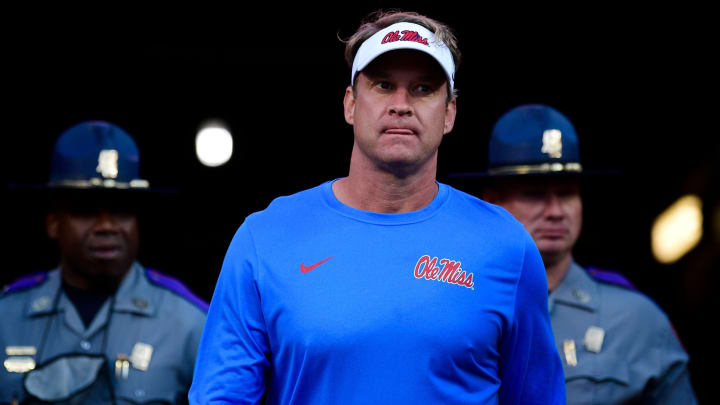College Football Is Changing Dramatically. Should We Be Worried?

I fell in love with college football when I was 12 years old and have been fortunate to cover the sport professionally for 46 years.
To me, college football is much more than a game. It is a way of life. It has been very good to me and my family. It has taken me places that a little country boy from Union Point, Ga. (population 1,500) would otherwise not have a chance to go.
But as the 2021 season enters its final few weeks I feel compelled to ask: Should we be worried about the future of college football?
My gut reaction is to say “no.” That’s because college football has been through major change before. And each time the people who play it, coach it, and watch it have adjusted. The game goes on. It’s that strong.
In 1978 John McKay, the Hall of Fame Coach from USC, was asked about the NCAA’s decision to reduce the number of total football scholarships allowed for each school from 105 to 95.
“Mark this day on your calendar,” he said. “This day is the ruin of college football. It will only go downhill from here.”
The scholarship limit is now 85 and the game has never been more popular.
But it should be noted that college football is currently going through more change than at any point in our lifetime. Let’s review:
**--Name, Image, and Likeness: Scholarship athletes now have the freedom to hire agents and sign deals for endorsements, public appearances, or anything that will generate income. This summer we learned that Alabama quarterback Bryce Young has an NIL deal for over $1 million.
The concern is that athletes will enroll at the school whose boosters can provide the best NIL deals. That ship, my friends, has sailed.
But the bigger concern is that NIL will turn into free agency. A player will simply pick up and leave one school for another because its boosters can provide a better NIL package.
“I don’t think people really say it this way but let’s not make a mistake, we have free agency in college football,” Ole Miss coach Lane Kiffin said during a press conference last week. The only difference, Kiffin noted, is that free agents in the NFL have to sign a contract to stay with their team. College players do not.
**--The transfer portal makes college free agency possible because it allows players to transfer once without having to sit out for a season. It has made a huge impact on recruiting as players are free to transfer until a May 1 deadline.
**--The early signing period in mid-December combined with the transfer portal and NIL makes roster management for coaches the most difficult it has ever been. It also puts schools in position of firing coaches earlier and earlier to get a new coach in and salvage its recruiting class.
**--Leadership vacuum from the NCAA. The NCAA and its member schools had an opening to deal with the NIL issue by coming up with a package of financial benefits that might have satisfied the courts. Instead the NCAA went all in legally on its right to control the value of an athletic scholarship. The Supreme Court slammed dunked the NCAA 9-0. Now the NCAA is restructuring and the leadership void is still there. College football needs an overall leader looking out for the sport as a whole.
**--Playoff controversy. This summer it looked like there was solid plan for a 12-team college football playoff that would provide greater opportunity and access for all 130 FBS schools. The plan would feature the six highest-rated conference champions plus six at-large teams. The first round would be played on campus. The working committee that put the plan together represented a cross-section of the sport from the SEC, Big 12, Group of Five, and Notre Dame.
But when the story broke in July that Oklahoma and Texas were leaving the Big 12 to join the SEC, the commissioners of the ACC, Big Ten, and Pac-12 got their collective noses out of joint. The hope was to expand the playoff sooner rather than later. If something doesn’t change the playoff won’t expand until the current four-team contract expires after the 2025 season.
That’s a lot of change and college football is going to have to work through each of these issues. It won’t be pretty.
Name, Image and Likeness is here to stay. You can’t have coaches making $10 million a year and limit opportunities to generate income for the players. That ship has sailed. The public and the courts are now on the side of the players.
The transfer portal isn’t going anywhere but it might make sense to have it open for a few designated periods of time during the course of the year instead of all the time.
I don’t see the early signing period going away but I do see it being moved to January to give schools, particularly those who have changed coaches, a little more breathing room.
We will expand the college football playoff because the fans want it and there is too much money to be made from it. Some conferences (ACC, Big Ten, Pac-12) want eight teams while others—including the SEC—are firm on 12. The SEC will not vote for eight and any vote among the 10 FBS conferences (plus Notre Dame) under the current contract must be unanimous to change the format.
And here is one more thing to worry about. This comes from someone in the industry I respect a great deal. We already have a number of high-profile players who are opting out of bowl games in order to get ready for the NFL. We’re used to that.
But what if we go to an eight or 12-team playoff? That means the players who reach the national championship game could have played in as many as 17 games. Teams that reach the championship now have played in 15 games.
If a player's draft status is pretty much set and with an agent planted firmly in their ear, would we have guys opting out of the College Football Playoff?
Don’t say it can’t happen.
Bottom line: College football as we have known it is going to change. It won’t be the same game we grew up with and have come to love.
Those of us who love the game are going to have to adjust.
We will.
We always have.
And the game will go on.
